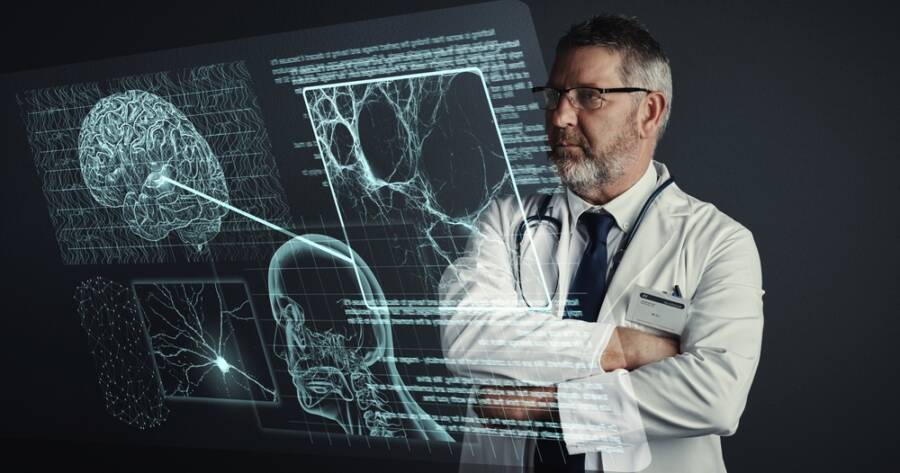Artificial intelligence is reshaping the healthcare industry, unlocking new possibilities for early disease detection, personalized treatments, and improved patient care. By analyzing vast amounts of medical data with unmatched speed and accuracy, AI is enabling doctors to make more informed decisions, streamline administrative tasks, and enhance patient outcomes. Understand how AI-driven innovations can lead to more efficient and effective medical practices.
AI-Powered Diagnostics: Speed and Precision in Disease Detection
One of the most significant advancements AI has brought to healthcare is in diagnostics. Traditional diagnostic methods often rely on human expertise, which, while invaluable, can sometimes be time-consuming and prone to human error. AI-powered tools, such as machine learning algorithms and deep learning models, can analyze medical images, lab results, and patient histories with remarkable accuracy.
For example, AI-driven imaging systems can detect early signs of cancer, neurological disorders, and cardiovascular diseases from MRI and CT scans, sometimes identifying abnormalities that might be missed by the human eye. In addition, AI algorithms are improving the detection of conditions like diabetic retinopathy, allowing for faster interventions that can prevent vision loss. With AI-assisted diagnostics, doctors can provide quicker, more precise diagnoses, leading to earlier and more effective treatments.
Personalized Medicine: Tailoring Treatments for Better Outcomes
Every patient is unique, and AI is playing a crucial role in making personalized medicine a reality. Traditional treatment plans are often based on generalized approaches, but AI leverages vast datasets, including genetic information, medical history, and real-time health monitoring, to tailor treatments to individual patients.
AI-powered predictive analytics help doctors determine how a patient will respond to specific treatments, reducing the trial-and-error approach in prescribing medications. This is particularly valuable in fields such as oncology, where AI can analyze tumor genetics to recommend the most effective therapies. Additionally, AI is aiding in drug discovery by identifying promising compounds and predicting their effectiveness, significantly reducing the time and cost required to develop new treatments.
Virtual Health Assistants and Remote Monitoring
AI is enhancing patient care beyond hospital walls through virtual health assistants and remote monitoring tools. Chatbots and AI-powered applications are helping patients manage their health by answering medical questions, reminding them to take medications, and providing basic guidance based on their symptoms. These tools not only improve patient engagement but also reduce the burden on healthcare professionals by handling routine inquiries.
Wearable devices and AI-driven remote monitoring systems are also revolutionizing chronic disease management. Patients with conditions like diabetes, heart disease, and respiratory disorders can use AI-enabled sensors that continuously track vital signs and detect warning signs of complications. These real-time insights allow doctors to intervene before a condition worsens, reducing hospital admissions and improving overall patient outcomes.
AI in Surgery: Enhancing Precision and Safety
Surgical procedures are benefiting immensely from AI advancements. Robotic-assisted surgeries, guided by AI algorithms, are enabling surgeons to perform complex procedures with greater precision, smaller incisions, and reduced risk of complications. These robotic systems use real-time imaging and AI-driven analytics to assist surgeons in navigating delicate areas with enhanced accuracy.
AI is also improving preoperative planning by analyzing patient data to predict potential risks and optimize surgical strategies. Additionally, post-surgical monitoring powered by AI helps identify early signs of infections or complications, allowing for prompt interventions that improve recovery rates. With AI-assisted surgical tools, procedures are becoming safer, more efficient, and less invasive, leading to better patient outcomes.
Overcoming Challenges and Ethical Considerations
Despite its incredible potential, the integration of AI in healthcare comes with challenges and ethical concerns. Data privacy and security remain major issues, as AI systems rely on vast amounts of patient information to function effectively. Ensuring that this data is protected from breaches and misuse is a top priority for healthcare institutions.
Moreover, while AI can enhance medical decision-making, it should complement rather than replace human expertise. The role of doctors and healthcare professionals remains critical in interpreting AI-generated insights, addressing ethical dilemmas, and providing compassionate care. Additionally, biases in AI algorithms must be addressed to ensure equitable healthcare outcomes for all patients, regardless of demographic or socioeconomic factors.
The Future of AI in Healthcare
As AI continues to evolve, its impact on healthcare will only grow. From improving diagnostic accuracy to enabling personalized treatments and enhancing patient care, AI-driven innovations are paving the way for a more efficient and accessible healthcare system.
While challenges exist, ongoing research, ethical considerations, and regulatory frameworks will help ensure AI is harnessed responsibly for the benefit of patients and healthcare professionals alike. With continuous advancements, AI is set to become an indispensable tool in revolutionizing healthcare for years to come.

